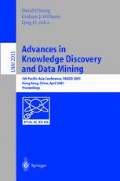Abstract
Association rule discovery techniques have gradually been adapt-ed to parallel systems in order to take advantage of the higher speed and greater storage capacity that they offer. The transition to a distributed memory system requires the partitioning of the database among the processors, a procedure that is generally carried out indiscriminately. However, for some techniques the nature of the database partitioning can have a pronounced impact on execution time and attention will be focused on one such algorithm, Fast Parallel Mining (FPM). A new algorithm, Data Allocation Algorithm (DAA), is presented that uses Principal Component Analysis to improve the data distribution prior to FPM.
Access this chapter
Tax calculation will be finalised at checkout
Purchases are for personal use only
Preview
Unable to display preview. Download preview PDF.
References
R. Agrawal, T. Imielinski, and A. Swami. Mining association rules between sets of items in large databases. In proceedings of the 1993 International Conference on Management of Data (SIGMOD 93), pages 207–216, May 1993.
R. Agrawal, H. Mannila, R. Srikant, H. Toivonen, and A. Verkamo. Fast discovery of association rules. In Advances in Knowledge Discovery and Data Mining, U. Fayyad, G. Piatetsky-Shapiro, P. Smyth, R. Uthurusamy, Eds. The AAAI Press, Menlo Park, pages 307–328, 1996.
D.W. Cheung, K. Hu, and S. Xia. Asynchronous parallel algorithm for mining asso-ciation rules on a shared-memory multi-processors’. In proceedings of the 10th Annual ACM Symposium on Parallel Algorithms and Architectures (SPAA), June 1998.
D.W. Cheung and Y. Xiao. Effect of data skewness in parallel mining of association rules. In proceedings of the 2nd Paci_c-Asia Conference on Knowledge Discovery and Data Mining, (PAKDD-98), Melbourne, Australia, pages 48–60, April 1998.
A. Geist, A. Beguelin, J. Dongard, W. Jiang, R. Manchek, and V. Sunderam. PVM: Parallel Virtual Machine. MIT Press, 1994.
I. Joliffe. Principal Component Analysis. New York: Springer Verlag, 1986.
R.B. Lehoucq and D.C. Sorensen. Deflation techniques for an implicitly restarted Arnoldi iteration. SIAM Journal on Matrix Analysis and Applications, 17(4):789–821, 1996.
Author information
Authors and Affiliations
Editor information
Editors and Affiliations
Rights and permissions
Copyright information
© 2001 Springer-Verlag Berlin Heidelberg
About this paper
Cite this paper
Manning, A.M., Keane, J.A. (2001). Data Allocation Algorithm for Parallel Association Rule Discovery. In: Cheung, D., Williams, G.J., Li, Q. (eds) Advances in Knowledge Discovery and Data Mining. PAKDD 2001. Lecture Notes in Computer Science(), vol 2035. Springer, Berlin, Heidelberg. https://doi.org/10.1007/3-540-45357-1_44
Download citation
DOI: https://doi.org/10.1007/3-540-45357-1_44
Published:
Publisher Name: Springer, Berlin, Heidelberg
Print ISBN: 978-3-540-41910-5
Online ISBN: 978-3-540-45357-4
eBook Packages: Springer Book Archive

